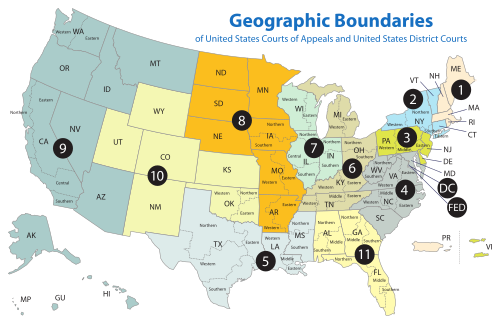Contents
The District Court of Guam[1] (in case citations, D. Guam) is a United States territorial court with jurisdiction over the United States territory of Guam. It sits in the capital, Hagåtña. Appeals of the court's decisions are taken to the United States Court of Appeals for the Ninth Circuit. It is not an Article III court, and therefore its judges do not have life tenure, but are appointed to ten-year terms.[2]
History

The District Court of Guam was established in 1950 by the Guam Organic Act to have the same jurisdiction as a United States district court.[1] Under Section 22(a) of the Guam Organic Act, the Court was granted:
- in all causes arising under the laws of the United States, the jurisdiction of a district court of the United States as such court is defined in section 451 of title 28, United States Code;
- original jurisdiction in all other causes in Guam, jurisdiction over which has not been transferred by the legislature to other court or courts established by it, and;
- such appellate jurisdiction as the legislature may determine.
In 1951, the Guam Legislature created Commissioners' Courts, the Police Court, and the Island Court, decisions from which were appealable to the District Court. In 1974, the Legislature consolidated these courts into the Guam Superior Court. The legislature also created a Guam Supreme Court to hear appeals from the Superior Court. However, the Ninth Circuit found in 1976 that the appellate jurisdiction of the District Court could not be transferred without authorization by Congress, and the Supreme Court of the United States upheld this ruling in a 5–4 decision in 1977. Justice Thurgood Marshall wrote the dissenting opinion, in which he argued that Congress had plainly authorized the enactment of the challenged legislation.[3] Further legislation divested the District Court's appellate jurisdiction over local matters in 1994.[4]
The District Court was housed in the Guam Congress Building from 1950 to 1968, in the Courthouse of Guam from 1968 to 1978, in the Pacific News Building from 1978 to 2000, and since then in the United States Courthouse Building.[4]
Current judge
As of August 8, 2006:
| # | Title | Judge | Duty station | Born | Term of service | Appointed by | ||
|---|---|---|---|---|---|---|---|---|
| Active | Chief | Senior | ||||||
| 6 | Chief Judge | Frances Tydingco-Gatewood | Hagåtña | 1958 | 2006–present | 2006–present | — | G.W. Bush |
Vacancy and pending nomination
| Seat | Prior judge's duty station | Seat last held by | Vacancy reason | Date of vacancy | Nominee | Date of nomination |
|---|---|---|---|---|---|---|
| 1 | Hagåtña | Frances Tydingco-Gatewood | Term expired | October 30, 2016 | – | – |
Former judges
| # | Judge | State | Born–died | Active service | Chief Judge | Senior status | Appointed by | Reason for termination |
|---|---|---|---|---|---|---|---|---|
| 1 | Paul D. Shriver | GU | — | 1951–1959 | 1951–1959 | — | Truman | |
| 2 | Eugene R. Gilmartin | GU | — | 1959–1961 | 1959–1961 | — | Eisenhower | |
| 3 | Paul D. Shriver | GU | — | 1961–1969 | 1961–1969 | — | Kennedy | |
| 4 | Cristobal C. Duenas | GU | — | 1969–1991 | 1969–1991 | — | Nixon | Resignation[5] |
| 5 | John S. Unpingco | GU | — | 1992–2004 | 1992–2004 | — | G.H.W. Bush | Expiration of term [6] |
See also
- Courts of the United States
- List of current United States district judges
- List of United States federal courthouses in Guam
- Politics of Guam
- Supreme Court of Guam
- United States Attorney for the Districts of Guam and the Northern Mariana Islands
- District Court for the Northern Mariana Islands
References
- ^ a b "The Organic Act of Guam" (PDF). District Court of Guam. Retrieved April 8, 2010.
The judicial authority of Guam shall be vested in a court established by Congress designated as the "District Court of Guam" ...The District Court of Guam shall have the jurisdiction of a district court of the United States, including, but not limited to, the diversity jurisdiction provided for in 1332 of title 28, United States Code, and that of a bankruptcy court of the United States.
- ^ "48 U.S. Code § 1424b – Judge of District Court; appointment, tenure, removal, and compensation; appointment of United States attorney and marshal". Legal Information Institute. Cornell Law School. Retrieved August 25, 2017.
- ^ Guam v. Olsen, 431 U.S. 195 (1977).
- ^ a b "History of the District Court of Guam" (PDF). gud.uscourts.gov. District Court of Guam. Retrieved July 27, 2017.
- ^ "PN1293 — John S. Unpingco — The Judiciary". www.congress.gov. Retrieved August 13, 2020.
- ^ "PN1479 – Frances Marie Tydingco-Gatewood – The Judiciary". www.congress.gov. Retrieved August 13, 2020.


